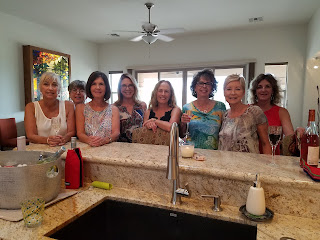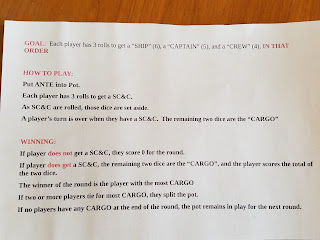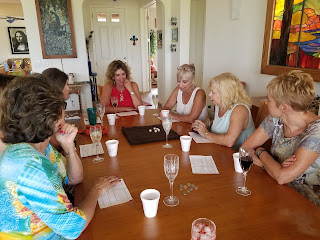Judy arranged for the Women Who Wine to take a tour of the HF Coors factory. There were 10 ladies who were able to join us for the day's events. After the tour, we shopped in the showroom, of course! Then we adjourned to the "Board Room" at the Grill for lunch.
A little backstory about HF Coors:
HF Coors - Dinnerware Made in the USA 100%, was formed in California in 1925 by Herman Frederick Coors, son of the renowned Coors brewery founder, Adolf Coors. Interestingly enough, the HF Coors dinnerware business helped keep Coors brewery "afloat" during prohibition! ... Adolph Coors opened the Colorado Glass Works in 1887 to manufacture beer bottles for his brewery, the Adolph Coors Brewing Company. The Glass Works was leased to German-born John Herold in 1910, who incorporated the Herold China and Pottery Company on the brewery site in Golden, CO. Herold used clay from nearby mines to make dinnerware and heat-resistant porcelain ovenware under the trademark Herold Fireproof China. Adolph Coors Company acquired Herold China in 1914. The company began producing chemical porcelain in 1915 as a result of a World War I embargo on German imports. Adolph Coors’ second son, Herman F. Coors, was named manager in 1916. Herold China was renamed Coors Porcelain Company in 1920, and the trademark “Coors U.S.A.” was first used. After World War I, Coors Porcelain made fine china and cookware bearing the trademarks Rosebud, Glencoe Thermo-Porcelain, Colorado and others. During Prohibition, the ceramic business was largely what kept the brewery afloat. Herman left in 1925 to start the H.F. Coors China Company, a manufacturer of dishes for restaurants and institutional use, in Inglewood, CA. The H.F. Coors Pottery's trademarks include Coorsite, Alox and Chefsware. HF Coors' assets were acquired by Catalina China, Inc. of Tucson and moved from California to Tucson in 2003
 |
| HF Coors - Here we come for our tour! |
 |
| HF Coors showroom |
 |
| The start of the tour! |
 |
The painting room where designs are applied freehand.
Anyone want to try? |
 |
| It all starts with the clay. |
 |
| Another station in the process |
 |
| Pressing the clay into a mold. |
 |
| Look, the clay is now a bowl! |

































































